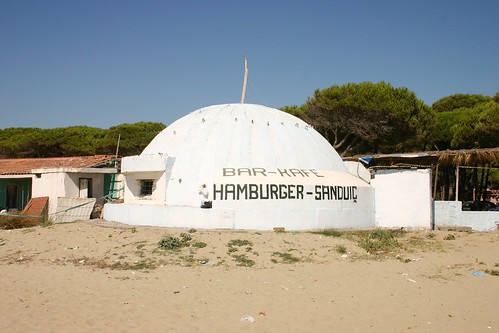 Any visitor to Eastern Europe will quickly notice the heavy toll that decades of Communist rule exacted on the landscapes and cityscapes of the region. Nowhere is this more conspicuous than Albania, where both the cities and countryside are pockmarked with thousands and thousands of eerie concrete domes. These are the remnants of the massive-scale system of bunkers Albanian dictator Enver Hoxha built throughout the 1970s and 1980s. As Albania grew more and more isolated, Hoxha became increasingly paranoid about the possibility of invasion from the capitalist West, or from its Communist neighbors with whom Albania’s relations were icy at best. This not-so-imminent threat prompted Hoxha to order construction of 750,000 bunkers – one for every four Albanians. The process used three times as much concrete as was used to build the French Maginot line, and cost twice as much. They were never used. Until recently.
Any visitor to Eastern Europe will quickly notice the heavy toll that decades of Communist rule exacted on the landscapes and cityscapes of the region. Nowhere is this more conspicuous than Albania, where both the cities and countryside are pockmarked with thousands and thousands of eerie concrete domes. These are the remnants of the massive-scale system of bunkers Albanian dictator Enver Hoxha built throughout the 1970s and 1980s. As Albania grew more and more isolated, Hoxha became increasingly paranoid about the possibility of invasion from the capitalist West, or from its Communist neighbors with whom Albania’s relations were icy at best. This not-so-imminent threat prompted Hoxha to order construction of 750,000 bunkers – one for every four Albanians. The process used three times as much concrete as was used to build the French Maginot line, and cost twice as much. They were never used. Until recently.
While the Albanian people are fortunate that the bunkers never proved necessary for their original purpose, they are now saddled with the question of what to do with these relics of a bygone era. A handful have been removed or destroyed, but the structures were sufficiently well-built as to make the process of doing so slow and costly.
The answer may lie – somewhat unexpectedly – in local entrepreneurship. This article from openDemocracy details some of the ways enterprising Albanians have transformed the once-useless edifices into small bars, kiosks, and restaurants. Their efforts capitalize on Albania’s growing tourist industry, as many visitors are attracted to the Cold War-era curiosities. Now, instead of merely posing for photos in front of a graffiti-ridden structure, tourists can shell out some cash for a drink, a sandwich, or even a room for the night.
Two imaginative Albanian graduate students have even bigger plans for what they call “legacies of a xenophobic age.” The authors of the Concrete Mushroom project foresee a future in which the anachronistic bunker network represents an opportunity for Albanians to find a source of income and employment. Their plan calls for each municipality to organize teams of residents tasked with designing the “bunker of their dreams” which could be anything from bed and breakfasts to town info-points to public restrooms.
While the vast majority of Albania’s bunkers remain unoccupied, the blooming industry that has arisen around the structures is a testament to the power of entrepreneurs to find opportunity where some see only unsolvable problems. It would be ironic, or perhaps oddly appropriate, if the legacy of one of Europe’s most strictly isolationist and anti-market regimes became one of the keys to the development of tourism and successful private enterprise in that same country.
Published Date: January 08, 2010